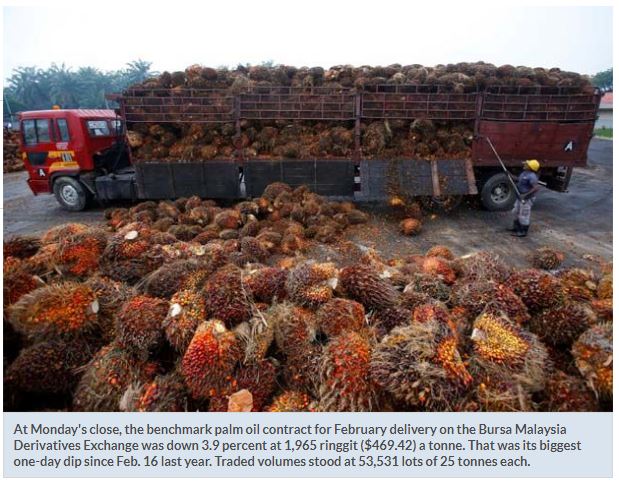Malaysian palm oil price in biggest fall in 21 months as Indonesia axes export levy
JAKARTA:Malaysian palm oil futures suffered their biggest fall in more than 21 months on Monday after Indonesia, the world’s top palm oil producer, announced measures to increase shipments.
The sharp drop in palm oil prices in late trading was in direct response to the announcement that Indonesia will help palm oil exporters by reducing its export levy to zero from $50 a tonne previously, traders said.
Until now the Indonesian levy had helped to make Malaysian palm oil more competitive. Its abolition could put Indonesian producers in a more advantageous situation because their costs
are lower than their Malay counterparts, one Kuala Lumpur-based trader said.
At Monday’s close, the benchmark palm oil contract for February delivery on the Bursa Malaysia Derivatives Exchange was down 3.9 percent at 1,965 ringgit ($469.42) a tonne. That was its biggest one-day dip since Feb. 16 last year.
Traded volumes stood at 53,531 lots of 25 tonnes each.
However, Malaysia‘s announcement on Monday of revisions to its biodiesel content rules are likely be supportive for palm oil in the intermediate and long-term, a second Kuala Lumpur trader said.
The so-called B10 biodiesel programme will raise the minimum bio-content that local producers must put in biodiesel to be used in transport to 10 percent from 7 percent at present, potentially boosting demand for palm oil as a feedstock.
Monday’s losses bring the Malaysian palm oil benchmark near to a three-year low of 1,949 ringgit, hit last week amid high inventories, rising production and sluggish demand.
Other traders said Monday’s declines were the culmination of multiple factors including weaker crude oil prices.
“There are still plenty of stocks, less demand and good production,” a trader said, when asked about the continued slide on Monday afternoon. “I think the market will correct further.”
Exports of Malaysian palm oil products over Nov. 1-25 fell 2.6 percent to 1,041,433 tonnes from 1,068,662 tonnes shipped over Oct. 1-25, cargo surveyor Intertek Testing Services said on
Sunday. Exports in October fell 14.1 percent.
Palm oil production and exports from Indonesia, the world’s top palm oil producer, fell in October from the previous month after the harvest season’s peak while stocks declined, according
to the median results of a Reuters survey.
Traders are looking to the G20 meeting in Buenos Aires this week for clues on how the trade feud between the United States and China will affect markets in 2019.
Palm oil prices are affected by movements of other edible oils that compete for a share in the global market.
In related oils, the Chicago soybean oil contract for December was down 0.7 percent, while the January soybean oil contract on the Dalian Commodity Exchange gained 0.4 percent.
The Dalian January palm oil contract was down 0.4 percent.
Crude oil prices, which also affect the palm oil market, clawed back some losses from close to an 8 percent plunge in the previous session, but Brent failed to hold above $60 a barrel
amid generally weak financial markets.
Reuters reported separately:
Top exporter Indonesia said on Monday it will temporarily remove a levy on palm oil after a sharp drop in prices which has hit farmers.
Indonesia collects levies from palm exporters to help finance the development of its palm-based biodiesel programme, as well as funding other palm oil agenda, such as replanting.
“Palm prices are falling rapidly … We see that the situation has become urgent, especially for farmers and the whole palm industry,” Darmin Nasution, the country’s coordinating minister for economic affairs, said.
The latest policy will take effect as soon as the Finance Ministry issues the regulation, he said.
As prices recover to $500 per tonne, levies of $25 will be imposed for crude palm oil and $5-$10 per tonne for its derivatives, Nasution said, adding that levies of $20-$50 per tonne will be imposed again when prices reach at least $550.
The palm oil benchmark contract in Kuala Lumpur has dropped almost 10 percent so far in November and touched its lowest since August 2015 last week.
It closed at 1,965 ringgit ($469.42) per tonne on Monday.
“We have agreed that the levy on palm oil and its products, due to price conditions, will be lowered to zero,” Nasution, who earlier this month said the government had decided not to change export levies, told reporters.
Nasution said the Crop Estate Fund has collected “more than enough” funds so far and its programmes will resume as normal.
Rida Mulyana, a senior Energy Ministry official, said the lower palm oil price meant the cost of biodiesel is less than regular diesel, so producers do not require a subsidy which is usually funded by the levy. ($1 = 4.1860 ringgit) – Reuters
Source: https://www.thestar.com.my/business/business-news/2018/11/27/palm-oil-takes-a-spill-after-indonesia-axes-export-levy/#brq7F89cZoVSAcid.99


 English
English




